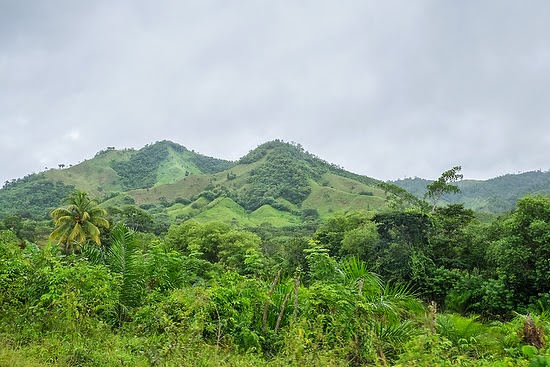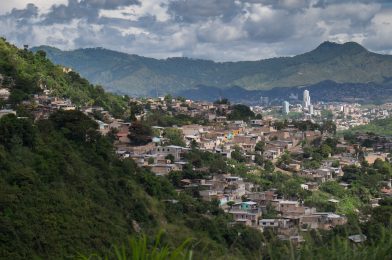| Fuji X-E2, Fujinon XF 18-55mm, ISO 400, ƒ/4, 1/1700 |
While in Honduras, I spent a long time in a Toyota Land Cruiser on dirt roads feeling like a bobblehead doll.
 |
| Fuji X-E2, Fujinon XF 18-55mm, ISO 2500, ƒ/7.1, 1/500–Raindrops got on the lens. |
We would be on dirt roads like this one for a couple of hours at a time.
I was in the front seat riding shotgun because I was 6’2″, and the others were much smaller in the back seat. The others had been here many times before and were astonished that I was getting any usable pictures. They had terrible experiences in these situations.
So how was I able to get sharp photos?
 |
| Fuji X-E2, Fujinon XF 18-55mm, ISO 1250, ƒ/7.1, 1/500 |
How I did it
1) Image Stabilization
I was shooting with my Fuji X-E2 camera and 18-55mm lens, which has integrated four-stop image stabilization that helps to minimize the appearance of camera shake normally inherent to low-light conditions and with longer focal lengths. The image stabilization made a huge difference and allowed me to use technology to compensate for my tossing around like a rag doll in the Land Cruiser.
2) Shutter-Speed
When you choose the Auto ISO on the camera, the camera automatically selects a sensitivity between the default and maximum values. Sensitivity is only raised above the default value if the shutter speed required for optimal exposure is slower than the value selected for MIN. SHUTTER SPEED.
Suppose the value selected for DEFAULT SENSITIVITY is higher than that chosen for MAX. The DEFAULT SENSITIVITY setting to the value specified for MAX. SENSITIVITY.
The camera may select shutter speeds slower than MIN. SHUTTER SPEED if pictures would still underexposing at the chosen value for MAX. SENSITIVITY.
I have set my AUTO ISO range of 200 to 6400. The one thing I do go to change regularly is the minimum shutter speed. I have it set for 1/500 when taking the photos from the moving vehicle.
Looking at the captions, you will notice that sometimes the camera would go even faster than 1/500. That is because I was in Aperture Priority and chose a ƒ-stop that bumped the shutter speed up.
I could have stayed in AUTO ISO and just gone manual, and the camera would then let me choose any shutter speed and aperture and adjust the ISO for a good exposure.
 |
| Fuji X-E2, Fujinon XF 18-55mm, ISO 800, ƒ/9, 1/500 |
Do your best to hold the camera still. I tried not to rest my arms on the window but to float, so the camera bounced as hard as we hit a bump.
4) Depth-of-field
In general, you will not be close to subjects, so shallow depth-of-field is not a significant concern, but I recommend capturing the sweeping landscape to shoot high aperture as I did on some of these photos.
In the first photo, I shoot at ƒ/4, and some pictures ƒ/10. So experiment and be sure you are not shooting at such a large aperture that your shutter speed goes down.
5) Roll down the window
I see many people trying to shoot through glass, and sometimes you have no choice. If you can roll down the window or slide it open, do so. The glass will degrade your photos’ colors, saturation, and sharpness.
 |
| Fuji X-E2, Fujinon XF 18-55mm, ISO 1250, ƒ/10, 1/500 |


